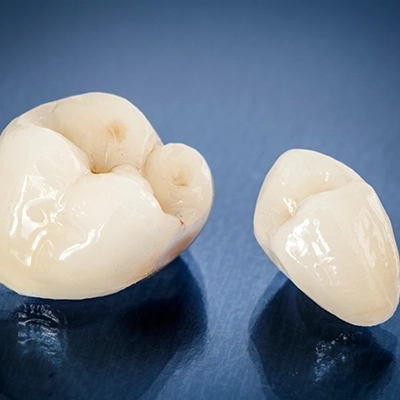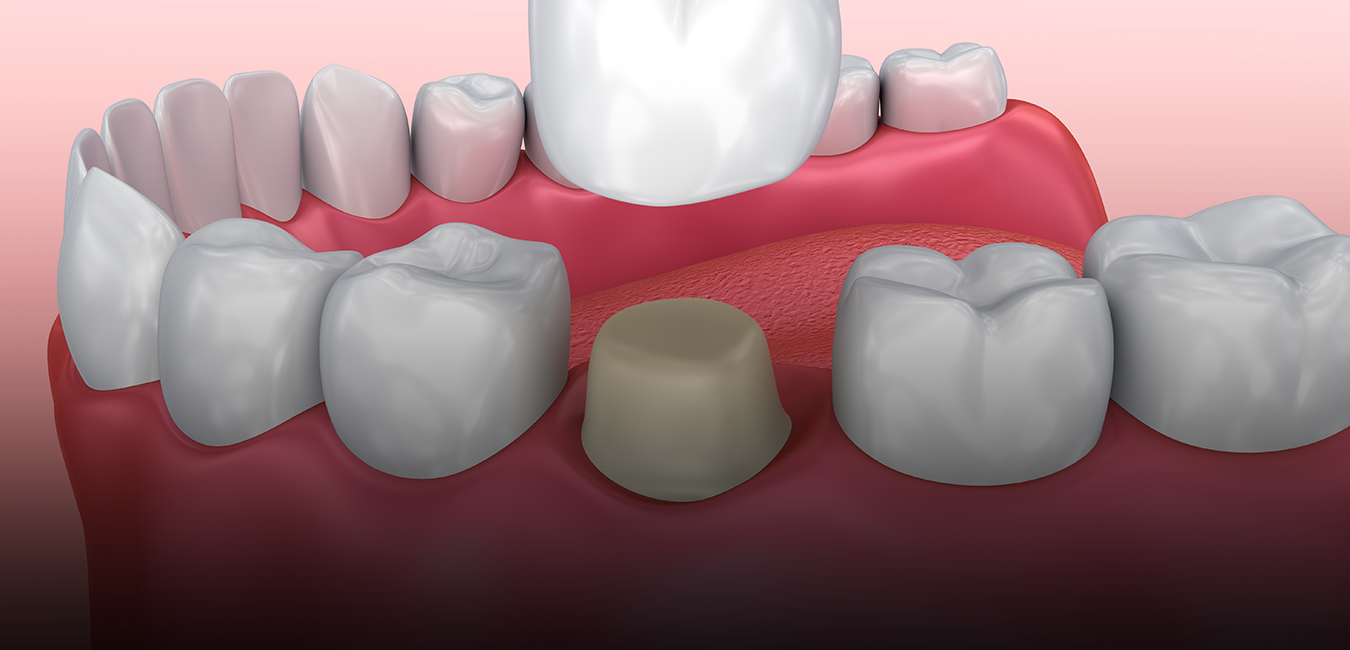Over the years, teeth become damaged due to several reasons including natural wear and tear, decay, and more. At Prime Family Dentistry, we offer a solution for damaged teeth: dental crowns.
A dental crown is a restorative dental device that is used to salvage the structure of a severely damaged tooth. It is a tooth-shaped cap that is placed over the affected tooth. A dental crown may also be used with a dental implant to replace a missing tooth.
There are several reasons why you might need a dental crown:

Cover/protect a weak tooth
Stabilize cracked tooth
Repair broken tooth
Repair severely worn-down tooth
Cover/strengthen a tooth with a large filling and little natural tooth structure
Reinforce a tooth after root canal treatment
Anchor dental bridge
Repair misshapen/discolored tooth
As an artificial tooth with a dental implant

Dental Crown Cost
When it comes to dental crown services, the cost can vary depending on various factors such as
Type of crown:
Different types of crowns (porcelain, gold, metal, ceramic) will affect the cost.
Location of practice:
Type of insurance:
If you are using insurance to cover the cost of your dental crown, the type of insurance you have will affect the cost.
Difficulty of the procedure:
The difficulty of the procedure will affect the cost as more complex procedures require more time and specialized care.
Number of crowns needed:
The number of crowns needed will also affect the cost. Getting multiple crowns will likely cost more than getting just one.
Dental Crown Procedure
Step 1: Impression and shade taking
Impression and shade taking is the first step in the dental crown procedure. During this step, the dental team will take an impression of the tooth and surrounding area. They will also take a digital image of the tooth and shade matching of the surrounding teeth to ensure the shade of the new crown matches.

Step 2: Preparation
Preparation is the second step in the dental crown procedure. This step involves the removal of any existing decay or damage from the tooth and shaping it to accommodate the new crown.
Step 3: Taking of final impression
Taking the final impression is the third step in the dental crown procedure. During this step, the dental team will take a final impression of the prepared tooth and surrounding area to ensure accuracy.
Step 4: Creating a temporary crown
Creating a temporary crown is the fourth step in the dental crown procedure. During this step, the dental team will use the final impression to create a temporary crown that will be placed on the prepared tooth in between visits.
Step 5: Application of the permanent crown
Application of the permanent crown is the fifth and final step in the dental crown procedure. During this step, the dental team will place the permanent crown on the prepared tooth and adjust it as necessary. Once the crown is placed, the patient should be able to return to their normal activities.

Care and Maintenance of Dental Crowns
Care and maintenance of dental crowns depends on whether you have a temporary or permanent crown.
Temporary crowns
are typically placed when you must wait for the lab to fabricate your permanent one. Therefore, they’re not designed to last very long, which means it’s critical to properly care for it so it doesn’t fail before your permanent one is ready. Here are a few tips to care for and maintain your temporary crown:
Avoid sticky or hard foods
Floss properly
Chew on the opposite side as much as possible
Permanent crowns
are designed to last up to 20 years with proper care and maintenance, including: Practicing proper oral hygiene including brushing and flossing properly and using an alcohol-free mouthwash Practice proper oral habits including not using teeth as tools, not crunching on hard candies or ice, etcDental Crown Benefits
Dental crowns offer several benefits, including:
Salvaging the structure of a severely damaged tooth
Protects a dead tooth from falling apart
Versatile cosmetic and functional treatment
Best protection for a tooth with a history of decay
More durable than other restorations
Dental Crown FAQs
If you have any questions or concerns about dental crowns, the team at Prime Family Dentistry will be happy to address those with you. We get a lot of questions about dental crowns- below are answers to some of the most common ones:
How long do dental crowns last?
On average, dental crowns last 5 to 15 years. If cared for properly, a crown may last up to 20 years. Some indications that a crown is nearing the end of it’s lifespan include:
Pain in the crowned tooth
Feeling of instability of the crown
Crown is not aesthetically pleasing
Is a dental crown painful?
No, a dental crown is not painful. Thanks to the advancements in dental technology, most dental procedures can be done pain-free.
Do dental crowns hurt?
Patients are given local anesthesia to numb the area before we get started. Therefore, you should not feel any pain. If you have dental anxiety, we offer sedation options to keep you relaxed during the procedure. You may have some discomfort as the anesthesia wears off, but this should subside fairly quickly.
How does a dental crown work?
A dental crown is a restorative device used to cover and protect a severely damaged tooth. It is a cap that fully encases the tooth, which prevents bacteria from getting into the tooth and causing further damage and decay.

